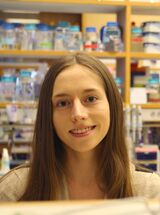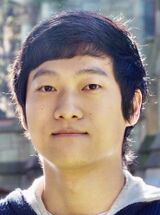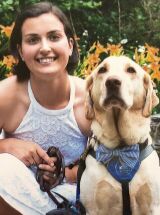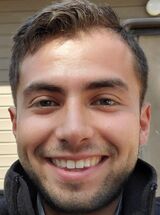Celebrating NGG Graduates
Please join us in our celebration as we highlight our NGG graduates.
The profiles are sectioned by degree type:
Doctor of Philosophy

Christopher Adam
Mentors: John A. Wolf, PhD; Douglas A. Coulter, PhD
Thesis Title: Hippocampal circuit disruptions underlying cognitive deficits following traumatic brain injury or induced seizures

Yuzhang Chen
Mentors: Flavia Vitale, PhD; Brian Litt, MD
Thesis Title: CA1 Pyramidal Neurons Drive Seizures: A Study Using Novel Tools & Machine Learning-Based Analysis Approaches
Research and Lab Description: The Center for Neuroengineering and Therapeutics develops new devices and methods to diagnose and treat brain and nervous system disorders. In my PhD, I focused on two aspects: 1) validating transparent carbon-based electrodes to record neural signals from the seizing brain and 2) developing a new on-demand seizure model to efficiently screen potential epilepsy therapeutics in chronic epilepsy models.

Jared Collina
Mentor: Maria Geffen, PhD
Thesis Title: Strategies underlying auditory categorization
Research and Lab Description: My work combined high-density electrophysiological recordings with computational behavioral modeling to uncover how the mouse auditory cortex (ACx) builds and uses category representations during sound categorization. We link trial-by-trial spiking activity to learning models in order to probe the relationship between neural "neurometric" boundaries and evolving behavioral strategies.

Katie Copley
Mentor: James Shorter, PhD
Saul Winegrad Award for Outstanding Dissertation
Thesis Title: Developing RNA therapeutics for TDP-43 proteinopathy in ALS/ FTD
Research and Lab Description: The research in the Shorter lab centers around developing strategies to combat aggregation in neurodegenerative disorders. My dissertation focused on developing RNA chaperones to target TDP-43 aggregation, which occurs in disorders including ALS and FTD. I also studied a splice isoform, shortened TDP-43.
Post PhD Plans: I will be a postdoctoral associate in the lab of Dr. Junjie Guo at Yale.
Mentor Comment: During her superb Ph.D., Dr. Copley forged an exceptional body of work pioneering RNA-based therapeutics to counter protein aggregation in models of neurodegeneration—a bold and high-impact approach that opens new therapeutic frontiers. Her scientific achievements earned her numerous accolades, including the Ruth L. Kirschstein National Research Service Award from NINDS and the Saul Winegrad Award for best dissertation by a NGG student. These honors reflect the innovation, rigor, and trailblazing spirit that define her research.

Alice Dallstream
Mentor: Josh Gold, PhD
Thesis Title: DEVELOPING BEHAVIORAL METRICS FOR COMPUTATIONAL MODELS OF PSYCHOPATHOLOGY

Xiaomao Ding
Mentor: Maria Geffen, PhD
Thesis Title: Neuronal mechanisms underlying predictive coding in the auditory cortex

Brianna DiSanza
Mentors: Rebecca Ahrens-Nicklas, MD, PhD; Elizabeth Bhoj, MD, PhD
Thesis Title: Elucidating the role of BCAT-1 in mitochondrial function and neurodevelopment
Research and Lab Description: The Ahrens-Nicklas and Bhoj labs focus on novel human gene discovery in undiagnosed pediatric patients with an emphasis on inherited disorders of biochemistry (i.e., inborn errors of metabolism, IEM) and neurodevelopment. My research specifically focused on utilizing molecular and biochemical techniques to investigate the role of BCAT1 in the developing brain. Through in vitro and in vivo modelling, we uncovered biallelic variants in BCAT1 as the genetic basis of a previously undefined neurometabolic disorder. We further reveal a unique metabolic mechanism of BCAT1 as a mitochondrial regulator in neurons which in turn alters neuronal development and animal behavior. Ultimately, this research expands the foundational science supporting the regulatory role of BCAT1 in neurodevelopment and mitochondrial homeostasis.
Mentor Comment: During her thesis work, Brianna consistently demonstrated a remarkable independence and ability to overcome obstacles. She was dedicated to using science to improve our understanding of rare neurogenetic disorders.

Emily Feierman
Mentor: Erica Korb, PhD
Thesis Title: Uncovering the role of histone variant H2BE in chromatin regulation, synaptic function, and memory

Evan Gallagher
Mentors: Robert Mach, PhD; Meagan McManus, PhD
Thesis Title: Noninvasive Detection of Oxidative Stress in Mouse Models of Proteinopathy via Positron Emission Tomography with [18F]ROStrace

David Goldberg
Mentor: Wanding Zhou, PhD
Thesis Title: Linking human epigenome variation to traits: cell identity and pathological brain aging

Caela Long
Mentors: Kelly Jordan-Sciutto, PhD; Judith B. Grinspan, PhD
Thesis Title: Acidic nanoparticles prevent HIV pre-exposure prophylaxis (PrEP) inhibition of oligodendrocyte differentiation

Hannah Loo
Mentor: Jennifer L. Orthmann Murphy, MD, PhD
Thesis Title: Characterizing the role of deep cortical microglia in demyelination and remyelination
Research and Lab Description: The Orthmann-Murphy lab studies the role of glial cells in acquired and inherited myelin disorders. My thesis focused on better understanding the role of cortical microglia in cuprizone-mediated demyelination and remyelination.
Post PhD Plans: applying for jobs in the college access/educational non-profit space
Mentor Comment: Hannah is my first graduate student and the first to graduate from my lab! I am extremely proud of her beautiful work characterizing the role of cortical microglia in the setting of demyelinating injury, a complex but important project that helps us understand how microglia can be a barrier to remyelination. We will miss her but look forward to her future roles aimed at improving access to education.

David Lozano
Mentor: Franz Weber, PhD
Thesis Title: Neural Circuits and Dynamics Regulating Rapid Eye Movement Sleep

Michael Murphy
Mentor: Elizabeth A. Heller, PhD
Thesis Title: Corticosterone epigenetically accelerates the loss of behavioral flexibility
Research and Lab Description: The Heller lab focuses on epigenetic and behavioral changes associated with stress and substances of abuse. Mike's thesis work entailed delineating the neuroepigenetic changes in the dorsomedial and dorsolateral striatum associated with the accelerated loss of behavioral flexibility during stress hormone administration.
Post PhD Plans: Management/Strategy consulting at McKinsey & Co. Starting Summer 2025.
Mentor Comment: Mike is a highly motivated individual who takes on every challenge with enthusiasm and a positive attitude. Mike designed his own thesis project to characterize epigenetic signatures of habit formation under stress hormone administration, and his project incorporated many distinct components of neuroepigenetic research, such as animal behavior, molecular biology, and in silico informatics. He has been an integral member of our research team, and his exceptional technical skills, problem-solving abilities, and attention to detail will help him excel in future endeavors.

Kelsey Nemec
Mentor: Chris Bennett, MD
Thesis Title: ER-Hoxb8 conditionally immortalized macrophages for study of microglia replacement in brain health and disease
Research and Lab Description: Kelsey completed her PhD in the lab of Dr. Frederick "Chris" Bennett. Her thesis project focused on manipulating microglia to study and treat brain diseases, where she ultimately created a novel cell therapy model of microglia replacement by way of genetically engineered ER-Hoxb8 conditionally immortalized macrophages. Kelsey used this model to study Aicardi-Goutières Syndrome, a rare but progressive pediatric interferonopathy. She discovered that ADAR1 is necessary for macrophage survival and engraftment in the brain, and that microglia-specific clinical mutations in ADAR1 drive brain interferonopathy.
Post PhD Plans: Kelsey is currently a postdoctoral fellow at the Seattle Children's Research Institute in the lab of Dr. Nick Vitanza. There, Kelsey is studying how the immune microenvironment changes in diffuse intrinsic pontine glioma, a rare but universally fatal pediatric brain cancer. She is using the expertise she gained in the Bennett Lab to therapeutically engineer microglia to help treat DIPG.

Erin Purvis
Mentor: Kacy Cullen, PhD
Community-Engaged STEM Certificate
Thesis Title: A tissue-engineered rostral migratory stream for neuronal redirection and replacement following brain injury & A graduate certificate program in Community-Engaged STEM
Research and Lab Description: Erin conducted her dissertation research in Dr. D. Kacy Cullen’s lab where she created a neuronal replacement strategy that utilizes the first implantable, biomimetic tissue-engineered rostral migratory stream (TE-RMS) designed to leverage the brain’s natural mechanism for sustained neuronal replacement by replicating the structure and function of the native RMS to direct neuroblasts to sites of injury. Her work substantially advanced the TE-RMS as an in vitro tool that can be utilized to address basic questions regarding the underlying mechanisms of cell-cell communication and neuroblast migration and as a functional neuronal replacement strategy to mitigate neuronal loss. As part of her dissertation work, Erin also worked with Dr. Lori Flanagan-Cato to develop and implement the Community-Engaged STEM graduate certificate program at the University of Pennsylvania, which is the first formalized program for graduate students to connect their academic research with bettering the lives of the local Philadelphia community.
Post PhD Plans: After successfully defending her dissertation, Erin matriculated into the Civic Science Fellows program to continue her work building sustainable university-community partnerships. She is currently a Civic Science Postdoctoral Fellow at the Center for the Neurobiology of Learning and Memory at the University of California, Irvine.

Catherine Ubri
Mentor: Akiva Cohen, PhD
Thesis Title: Mild Traumatic Brain Injury Impairs Fear Extinction and Network Excitability in the Infralimbic Cortex

David White
Mentor: Johannes Burge, PhD
Thesis Title: How distinct sources of nuisance variability in natural images and scenes limit human stereopsis

Ruthie Wittenberg
Mentor: John Dani, PhD
Thesis Title: Ventral tegmental area serotonin augmentation as a possible intervention for adolescent nicotine-induced increased alcohol consumption

Mingxin Yang
Mentor: Guillaume de Lartigue, PhD
Thesis Title: Separate orexigenic hippocampal ensembles shape dietary choice by enhancing contextual memory and motivation
Research and Lab Description: Our lab develops and applies cutting-edge tools to study the role of the vagus nerve in feeding behavior. We pioneered the use of optogenetics and chemogenetics to manipulate vagal sensory neurons in freely behaving animals, demonstrating that selective stimulation of gut-innervating neurons is sufficient to drive dopamine-mediated reward. We were also the first to apply caspase-mediated ablation to assess the necessity of these neurons, revealing their essential role in nutrient-driven reward. Our team generated the first central map of vagal sensory projections using polysynaptic viral tracing, and more recently, we’ve advanced in vivo calcium imaging techniques to capture the real-time activity of vagal neurons in response to gut stimuli, hormones, and cardiovascular signals. These approaches have led to novel discoveries, including a functional gut-hippocampus circuit critical for memory, showing that disrupting gut-innervating vagal neurons impairs hippocampal-dependent memory. Our ongoing work builds on these foundational insights to further explore the vagus nerve’s role in brain-body communication.
Post PhD Plans: I will stay at Dr. de Lartigue's lab as a postdoc.
Mentor Comment: Mingxin Yang is an exceptionally talented and rigorous scientist whose groundbreaking research on nutrient-specific hippocampal memory has advanced our understanding of feeding behavior. She has demonstrated remarkable independence, creativity, and leadership throughout her PhD and is poised for a successful research career.
Combined Degree, MD-PhD

Daniel Connolly
Mentor: Zhaolan (Joe) Zhou, PhD
Thesis Title: Reading and writing DNA methylation in the mammalian brain

Timothy Cox
Mentors: Virginia Man-Yee Lee, PhD; Christoph A. Thaiss, PhD
Thesis Title: The Aged Microbiome Drives Cognitive Decline

David Dai
Mentors: Eddie Lee, MD, PhD
Thesis Title: Layer 2-3 PPARG+ Excitatory Neurons are Vulnerable in C9orf72-behavioral variant Frontotemporal Dementia



